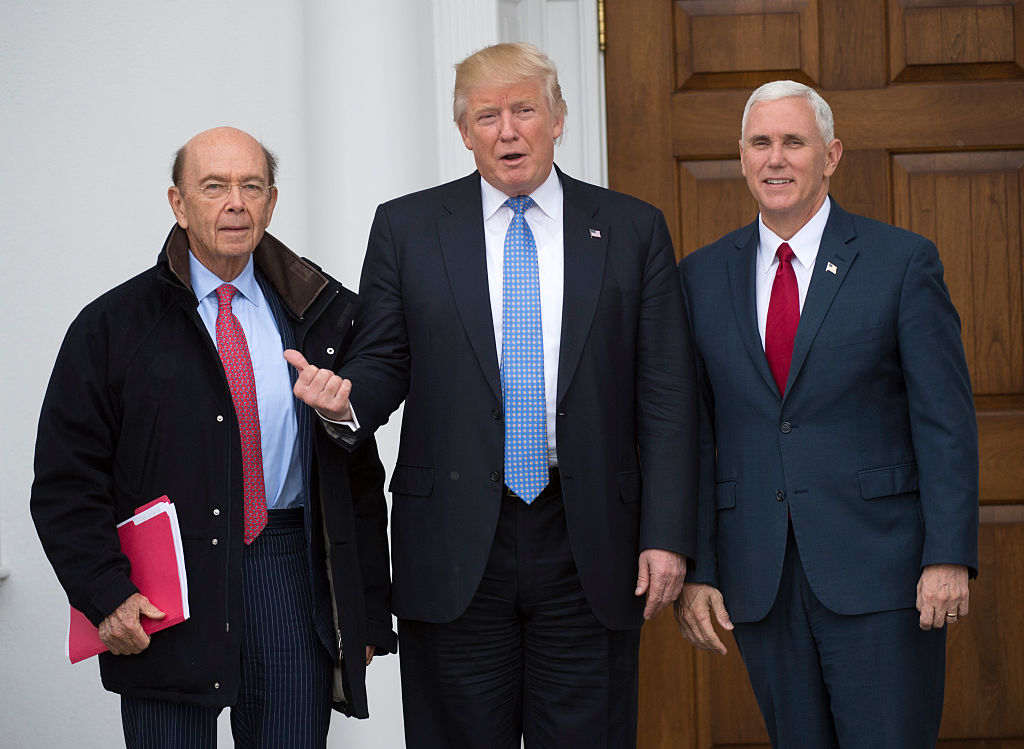Donald Trump's unfinished Cabinet is already the wealthiest in modern history


A free daily email with the biggest news stories of the day – and the best features from TheWeek.com
You are now subscribed
Your newsletter sign-up was successful
"Blue-collar billionaire" Donald Trump may tap multimillionaire Mitt Romney for secretary of state, but Romney — whose net worth is about $250 million — would be somewhere in the middle of Trump's Cabinet picks, wealth-wise.
Wilbur Ross, Trump's commerce secretary nominee, is worth at least $2.5 billion, according to Forbes, and Ross' nominated deputy, Todd Ricketts, is scion of the billionaire family that owns the Chicago Cubs. Betsy DeVos, whose father-in-law co-founded Amway, belongs to a family worth $5.1 billion. Treasury secretary nominee Stephen Mnuchin, a former Goldman Sachs executive and Hollywood financier, is worth more than $40 million; Trump's pick for transportation secretary, shipping heiress Elaine Chao, is worth some $37 million with her husband, Senate Majority Leader Mitch McConnell; and Rep. Tom Price (R-Ga.), Trump's would-be HHS secretary, is worth $13.6 million.
Most of those millionaires and billionaires earned their money the old fashioned way — inheritance — then built their familial windfall into a bigger fortune. "Many of the Trump appointees were born wealthy, attended elite schools, and went on to amass even larger fortunes as adults," note Jim Tankersley and Ana Swanson at The Washington Post. "As a group, they have much more experience funding political candidates than they do running government agencies."
The Week
Escape your echo chamber. Get the facts behind the news, plus analysis from multiple perspectives.

Sign up for The Week's Free Newsletters
From our morning news briefing to a weekly Good News Newsletter, get the best of The Week delivered directly to your inbox.
From our morning news briefing to a weekly Good News Newsletter, get the best of The Week delivered directly to your inbox.
Cabinet officials are frequently wealthy — George W. Bush's first Cabinet had a combined, inflation-adjusted net worth of about $250 million, and President Obama's commerce secretary, Penny Pritzker, is worth an estimated $2.5 billion — but Trump's Cabinet is already the wealthiest in modern American history. And he still has some nominees left — Oklahoma oil magnate Harold Hamm (net worth: $16.7 billion) is rumored to be on the short list for energy secretary. Politico estimates that the Trump Cabinet and administration could be worth up to $35 billion.
America's median income is $55,000. "This isn't a criticism or a conspiracy... but it's important to recognize that everyone's perspective and policy and government is shaped by the kind of life you've lived," Nicholas Carnes, a political scientist at Duke University, tells The Washington Post. "The research really says that when you put a bunch of millionaires in charge, you can expect public policy that helps millionaires at the expense of everybody else." So far, the wealthiest Cabinet official in American history has probably been Andrew Mellon, a three-president treasury secretary whose prescription of tax cuts for the wealthy helped fuel the Roaring '20s, and likely the Great Depression that followed.
A free daily email with the biggest news stories of the day – and the best features from TheWeek.com
Peter has worked as a news and culture writer and editor at The Week since the site's launch in 2008. He covers politics, world affairs, religion and cultural currents. His journalism career began as a copy editor at a financial newswire and has included editorial positions at The New York Times Magazine, Facts on File, and Oregon State University.
-
 6 of the world’s most accessible destinations
6 of the world’s most accessible destinationsThe Week Recommends Experience all of Berlin, Singapore and Sydney
-
 How the FCC’s ‘equal time’ rule works
How the FCC’s ‘equal time’ rule worksIn the Spotlight The law is at the heart of the Colbert-CBS conflict
-
 What is the endgame in the DHS shutdown?
What is the endgame in the DHS shutdown?Today’s Big Question Democrats want to rein in ICE’s immigration crackdown
-
 TikTok secures deal to remain in US
TikTok secures deal to remain in USSpeed Read ByteDance will form a US version of the popular video-sharing platform
-
 Unemployment rate ticks up amid fall job losses
Unemployment rate ticks up amid fall job lossesSpeed Read Data released by the Commerce Department indicates ‘one of the weakest American labor markets in years’
-
 US mints final penny after 232-year run
US mints final penny after 232-year runSpeed Read Production of the one-cent coin has ended
-
 Warner Bros. explores sale amid Paramount bids
Warner Bros. explores sale amid Paramount bidsSpeed Read The media giant, home to HBO and DC Studios, has received interest from multiple buying parties
-
 Gold tops $4K per ounce, signaling financial unease
Gold tops $4K per ounce, signaling financial uneaseSpeed Read Investors are worried about President Donald Trump’s trade war
-
 Electronic Arts to go private in record $55B deal
Electronic Arts to go private in record $55B dealspeed read The video game giant is behind ‘The Sims’ and ‘Madden NFL’
-
 New York court tosses Trump's $500M fraud fine
New York court tosses Trump's $500M fraud fineSpeed Read A divided appeals court threw out a hefty penalty against President Trump for fraudulently inflating his wealth
-
 Trump said to seek government stake in Intel
Trump said to seek government stake in IntelSpeed Read The president and Intel CEO Lip-Bu Tan reportedly discussed the proposal at a recent meeting
